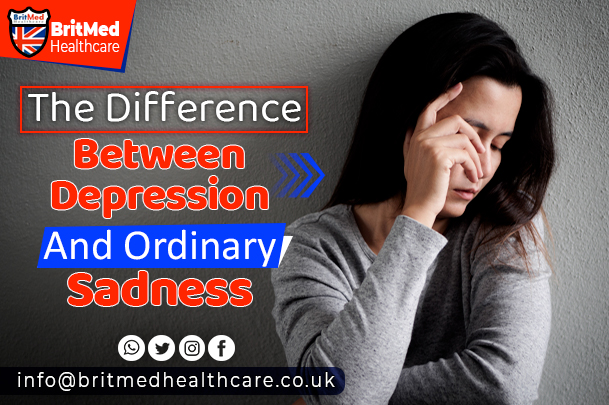The Difference Between Depression and Ordinary Sadness
It is very common in the context of mental health for one to mistake or not correctly distinguish between the feelings of normal sadness and the debilitating features of depression. Both emotions can be overwhelming and painful, but they are somewhat different and call for different kinds of interventions or treatments. This article attempts to outline the difference between normal sadness and depression as a means of developing better insight into these two complicated states of mind.
Normal Sorrow: An Adaptive and Natural Reaction
Normal sorrow is one of those human emotions felt by all individuals throughout life, when facing events of loss, rejection, or disappointment. It represents a natural response by the individual to any such event as part of their adaptation process. Essentially, in most instances, normal sorrow can be considered a transient condition that is self-limiting, where once its cause has been addressed, it dissipates. For instance, when people are in grief-that is, a state of having lost a loved one-the initial stages are usually filled with intense sadness; with time, however, the emotional ache gradually fades away.
Depression is a serious mental disorder.
On the contrary, depression is a severe mental health disorder that manifests through feelings of sadness, hopelessness, and helpless feelings, which are persistent and disabling. Unlike normal sadness, depression is not caused by any event or situation; rather, it emanates from a complex interplay of biological, psychological, and environmental factors. Depression can occur in various forms, which include major depressive disorder, also referred to as MDD; persistent depressive disorder, otherwise known as PDD; and postpartum depression, otherwise known as PPD.
Key Differences between Normal Sadness and Depression
There are a number of differences that distinguish normal sadness from depression, including the following:
- Duration: In cases of normal conditions, sadness is considered a short-term condition, which clears up as soon as the cause of sadness has been resolved. Depression, on the other hand, can persist for months or years if not treated properly.
- Intensity: A person normally experiences sadness, feelings of sorrow no more than disappointing to moderately sad. When it relates to depression, however, these feelings of sadness are overwhelming and characterized by feelings of hopelessness and helplessness.
- Impact on Daily Life: Where simple sadness interferes with the daily activities of a person to an extent, in its depressive stages, it indeed impairs the daily functioning of a person, which involves daily tasks, relationships, and activities that were once enjoyed.
- Coping Mechanisms: People who feel normal sadness cope by talking to friends or family members, hobbies, or even a therapist about their issues. In depression, there is often little to no ability to engage in traditional coping behaviors because of apathy and hopelessness.
- Biological Changes: There are distinct biological changes that accompany depression, an altered level of neurotransmitters, and morphological changes in those parts of the brain concerned with mood regulation.
Conclusion
While both normal sadness and depression are distressing and overwhelming experiences, they are two distinct mental health states. Therefore, the kind of treatment will also differ. A clear distinction between mere sadness and depression is highly needed to arrive at proper diagnosis and subsequently the most appropriate intervention. In acknowledging the singular features of depression, health professionals will be better prepared to extend appropriate treatment programs that can rise appropriately to meet the many biological, psychological, and environmental factors that contribute to this crippling illness.
References:
https://www.ncbi.nlm.nih.gov/pmc/articles/PMC3181878/
https://www.medicalnewstoday.com/articles/314418
https://www.mentalhealthfirstaid.org/2017/06/difference-sadness-depression/
Websites:
Britmed Healthcare: https://britmedhealthcare.co.uk/
Nightingale Hospital: https://www.nightingalehospital.co.uk/
Top Doctors: https://www.topdoctors.co.uk/doctor/ahmed-el-missiry
You can also book, Contact us on WhatsApp 08009708017




